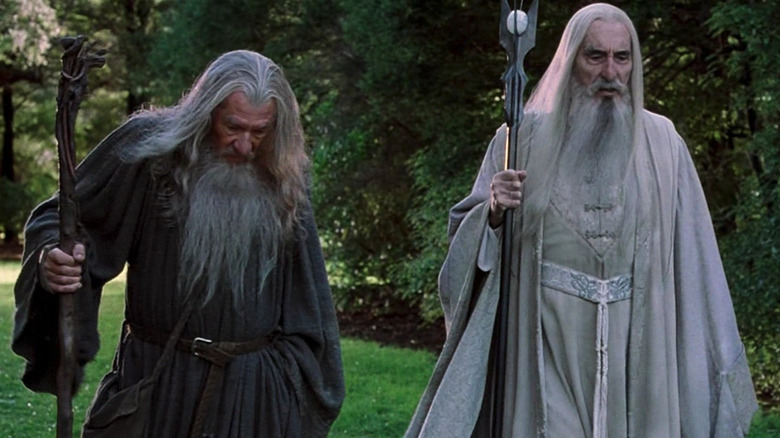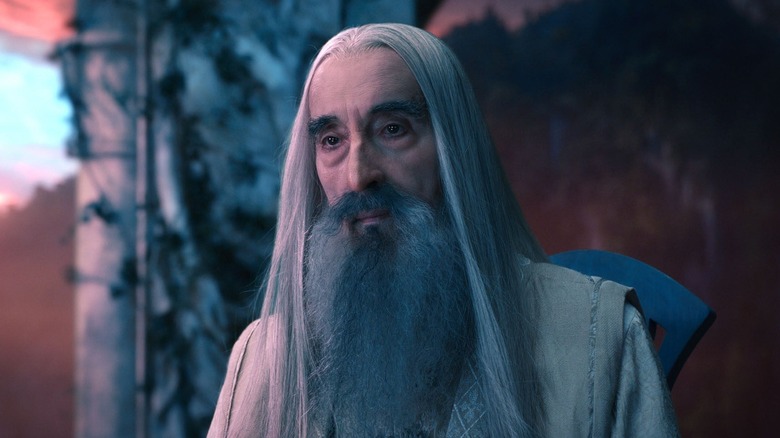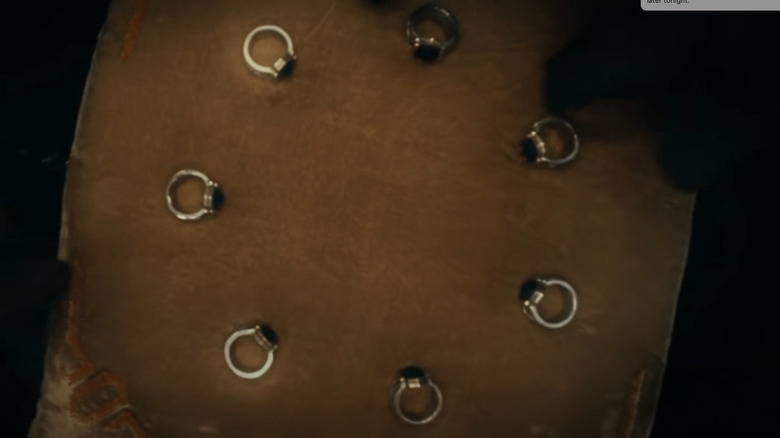A Lord Of The Rings Villain Secretly Makes Magic Rings - But Most Fans Never Knew
"The Lord of the Rings" is admittedly focused on one piece of jewelry above all others. While the One Ring soaks up the limelight, though, it is particularly important because Sauron doesn't have it. Sure, he's seeking it, and all his thought is bent on it. But he doesn't ever get his precious prized possession back. The Dark Lord doesn't even know where it is until it's in the fiery depths of Mount Doom — and by then, it's too late. Saruon's fate worse than death is sealed.
But there is another top-shelf Tolkienian villain who actively possesses and wields magical rings, and we're not talking about the Nazgûl (remember, the Ringwraiths have the Nine Rings for Mortal Men doomed to die). We're talking about Saruman.
That's right. The wayward Wizard has magic rings. How do we know this? From a pair of lines in the "Fellowship of the Ring" book. When Gandalf first arrives at Saruman's fortress of Isengard, he greets his fellow Wizard, and the text says, "He wore a ring on his finger." Shortly after his arrival, Saruman also refers to himself, saying, "For I am Saruman the Wise, Saruman Ring-maker, Saruman of Many Colours!" See that reference to ring-making? Combine it with the specific Tolkien call-out to the ring on his finger, and there's no doubt that Saruman has forged his own Rings of Power at this point in the story.
The lesser rings
Saruman's possession of an unnamed magical ring jives with something Gandalf tells Frodo earlier in the "Fellowship of the Ring" book. When he explains the Rings of Power to the Hobbit, he clarifies, "In Eregion long ago many Elven-rings were made, magic rings as you call them, and they were, of course, of various kinds: some more potent and some less." At this point, the Grey Wizard makes a critical clarification: "The lesser rings were only essays in the craft before it was full-grown, and to the Elven-smiths they were but trifles — yet to my mind dangerous for mortals. But the Great Rings, the Rings of Power, they were perilous."
This categorization of "Great Rings" versus other still-important but less potent magical trinkets establishes the fact that there are other magical rings in Middle-earth besides the 20 famous Rings of Power. In that same conversation, Gandalf also clarifies Saruman's relationship to magical rings, saying, "His knowledge is deep [...] The lore of the Elven-rings, great and small, is his province. He has long studied it, seeking the lost secrets of their making." Between the Wizard's interest in the craft and the fact that it's possible to make other magical rings, it's no surprise that Saruman ends up with his own — even if it doesn't help him in the long run.
How many Rings of Power are there? (And who has them during The Lord of the Rings)?
By the time of "The Lord of the Rings", there are a lot of magical rings circulating around Middle-earth. Tolkien doesn't tell us how many lesser rings there are. Based on the way they are presented, it seems a safe guess that there are quite a few, and their total number isn't known. In contrast, we know exactly how many Rings of Power there are. We're even actively seeing them forged over the first few seasons of Prime Video's "The Rings of Power" series (even if they're technically changing the timeline and order of their creation). Where are all of these major rings during "The Lord of the Rings"?
The One Ring is easy. Frodo has it. By the time the story starts, the Three Elven Rings are kept by Galadriel, Elrond, and Gandalf. The fate of the Seven Dwarven Rings is less clear. However, Gandalf tells Frodo (in the same conversation referenced above) that they have either been consumed by dragons or recaptured by Sauron. And the Nine Rings for Mortal Men? They're the most active of the bunch, as they're wielded by the Ringwraiths in the War of the Ring, at least until the One goes into the fire.
While these are the "big ones" that get all of the attention, it's fun to know that Tolkien actively worked other magical rings into his stories. They may have been less potent versions of the Big 20, but they had power nonetheless, and Gandalf clearly respected and feared what they could do. The fact that Saruman had cracked the code to create them means it's probably a good thing the good guys take him down sooner than later in the story.


